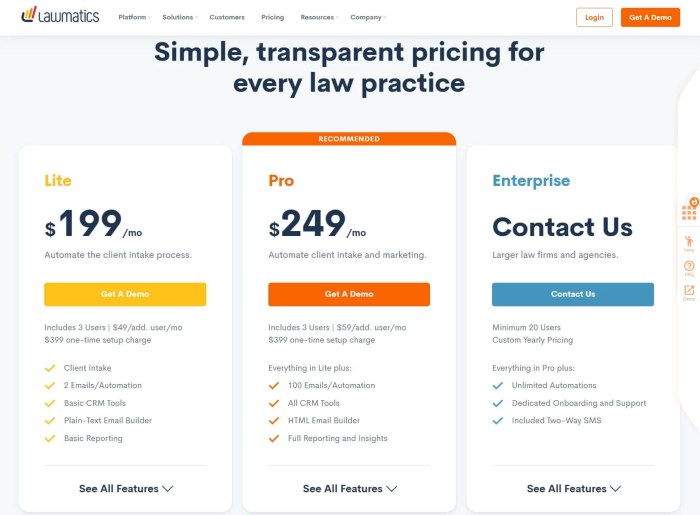Crm software for law firms – In today’s competitive legal landscape, efficient case management and strong client relationships are paramount for success. Law firms, regardless of size, can significantly benefit from implementing a robust Customer Relationship Management (CRM) system. A well-chosen CRM software solution can automate tasks, improve communication, enhance client satisfaction, and ultimately boost profitability. This comprehensive guide explores the key features, benefits, and considerations when selecting a CRM for your law firm.
Understanding the Need for CRM in Law Firms
Traditional methods of managing client information, cases, and communications often prove inefficient and prone to errors. Scattered spreadsheets, email chains, and physical files create bottlenecks and hinder productivity. A dedicated legal CRM software consolidates all this information into a centralized, easily accessible database. This enables:
- Improved Client Communication: Centralized communication logs ensure no message is missed, fostering stronger client relationships.
- Enhanced Case Management: Track deadlines, tasks, and progress on each case efficiently, minimizing missed deadlines and improving case outcomes.
- Increased Efficiency: Automation of repetitive tasks frees up time for lawyers and staff to focus on higher-value activities.
- Better Collaboration: Team members can access and share information seamlessly, promoting collaboration and reducing redundancies.
- Improved Reporting and Analytics: Gain valuable insights into firm performance, client behavior, and case outcomes to make data-driven decisions.
Key Features of a Legal CRM Software
While general CRM software can be adapted, purpose-built legal CRM solutions offer specialized features crucial for law firms. Look for these essential features:

Source: webfx.com
Core Features:
- Contact Management: Store and manage client information (contact details, case history, communication logs) in a centralized database.
- Case Management: Track case details, deadlines, tasks, documents, and communication related to each case.
- Document Management: Securely store and access legal documents, ensuring easy retrieval and version control.
- Calendar and Scheduling: Manage appointments, deadlines, and court appearances efficiently.
- Communication Tools: Integrate with email, phone, and other communication channels for seamless client interaction.
- Reporting and Analytics: Generate reports on case progress, client interactions, and firm performance.
- Task Management: Assign and track tasks, ensuring accountability and efficient workflow.
Advanced Features (Often Found in Premium Packages):, Crm software for law firms
- Time Tracking and Billing: Automate time tracking and billing processes for accurate invoicing.
- Matter Management: Comprehensive case management with features like conflict checking and matter staging.
- Client Portal: Provide secure client access to documents and communication.
- Integration with other Legal Software: Seamlessly integrate with practice management software, e-discovery tools, and other legal applications.
- Legal Specific Fields & Data Points: Customizable fields to accommodate specific legal data like court dates, case numbers, and jurisdiction.
- Workflow Automation: Automate repetitive tasks like email reminders, document generation, and reporting.
Choosing the Right CRM for Your Law Firm
Selecting the right CRM requires careful consideration of your firm’s specific needs and budget. Here’s a step-by-step guide:
- Assess your firm’s needs: Identify your pain points and what you hope to achieve with a CRM.
- Define your budget: CRM software comes at various price points, from affordable cloud-based solutions to enterprise-level systems.
- Research different CRM options: Explore various legal CRM software solutions and compare their features, pricing, and user reviews.
- Request demos and trials: Test the software to ensure it meets your needs and is user-friendly.
- Consider integration with existing systems: Ensure the CRM integrates seamlessly with your current software.
- Check for security and compliance: Choose a CRM that meets industry security and compliance standards.
- Read user reviews and testimonials: Get insights from other law firms who have used the software.
Popular CRM Software Options for Law Firms
Several reputable vendors offer CRM solutions specifically tailored for law firms. Researching and comparing these options is crucial. Some popular choices include (but are not limited to):
- Clio Manage: A popular cloud-based legal practice management software with robust CRM features.
- MyCase: Another leading cloud-based solution designed for law firms of all sizes.
- PracticePanther: Offers a comprehensive suite of tools for legal practice management, including CRM capabilities.
- CaseFox: A cloud-based CRM and practice management solution for legal professionals.
- CosmoLex: A comprehensive legal practice management software with integrated CRM features.
Note: This is not an exhaustive list, and the best CRM for your firm will depend on your specific needs and budget.
Implementing and Training: Crm Software For Law Firms
Successful CRM implementation requires careful planning and training. Key steps include:

Source: website-files.com
- Data Migration: Transferring existing client and case data to the new system.
- User Training: Providing comprehensive training to all staff members on how to use the software effectively.
- Ongoing Support: Ensuring access to technical support and ongoing assistance.
- Process Optimization: Adjusting workflows to leverage the CRM’s capabilities.
Frequently Asked Questions (FAQ)
- Q: How much does legal CRM software cost? A: Pricing varies widely depending on the features, vendor, and number of users. Expect to pay a monthly or annual subscription fee.
- Q: Is cloud-based CRM software secure? A: Reputable cloud-based CRM providers employ robust security measures to protect client data. Look for providers that comply with relevant data privacy regulations.
- Q: How long does it take to implement a CRM? A: Implementation time depends on the size of your firm and the complexity of the system. Expect a period of several weeks to several months.
- Q: Can I integrate my CRM with other software? A: Many legal CRMs offer integration with other legal software, such as accounting software, document management systems, and e-discovery tools.
- Q: What if my staff is resistant to adopting a new CRM? A: Thorough training, clear communication of benefits, and ongoing support are crucial to overcoming resistance. Highlighting the time-saving and efficiency gains can be persuasive.
Conclusion
Investing in a robust CRM is a strategic move for any law firm seeking to improve efficiency, enhance client relationships, and boost profitability. By carefully considering your needs, researching available options, and implementing the system effectively, you can unlock the full potential of your legal practice. Remember to prioritize security, integration, and user-friendliness when making your selection.
References
- Clio Manage
- MyCase
- PracticePanther
- Add other relevant links here as needed
Call to Action
Ready to streamline your law firm’s operations and elevate your client relationships? Contact us today for a free consultation to discuss your CRM needs and find the perfect solution for your practice!
Helpful Answers
What are the key features to look for in a law firm CRM?
Essential features include contact management, case management, document storage, task management, calendaring, reporting and analytics, and ideally, integration with other legal software.
How much does CRM software for law firms cost?
Pricing varies greatly depending on the features, the number of users, and the vendor. Expect a range from affordable monthly subscriptions to more substantial investments for enterprise-level solutions. Many vendors offer free trials or demos.
Is CRM software difficult to learn and implement?
Most modern CRMs are designed with user-friendliness in mind. Many offer intuitive interfaces and comprehensive training resources. However, the implementation process may require some initial setup and training for your team.
Can a CRM system improve client relationships?

Source: contentmavericks.com
Absolutely. A CRM allows for better communication, personalized service, and proactive follow-up, all of which contribute to stronger client relationships and increased client retention.
